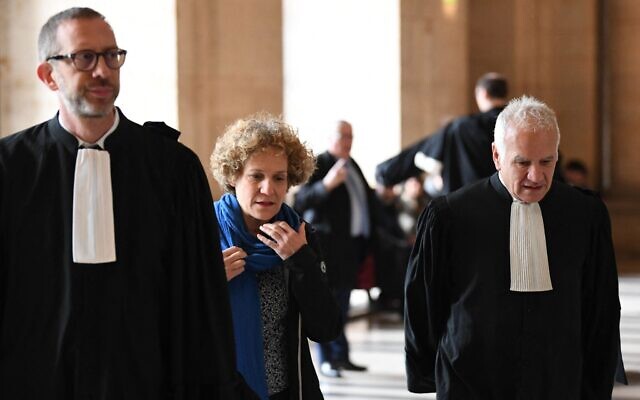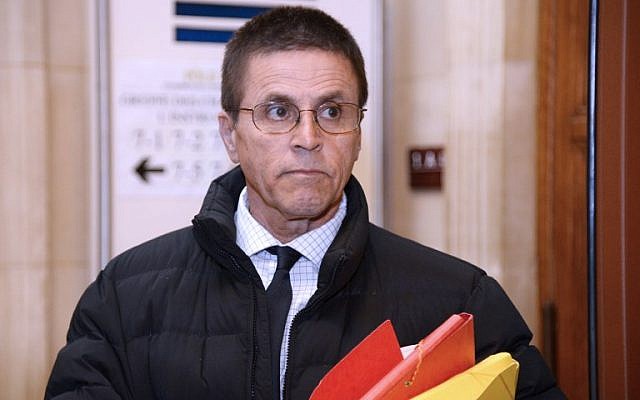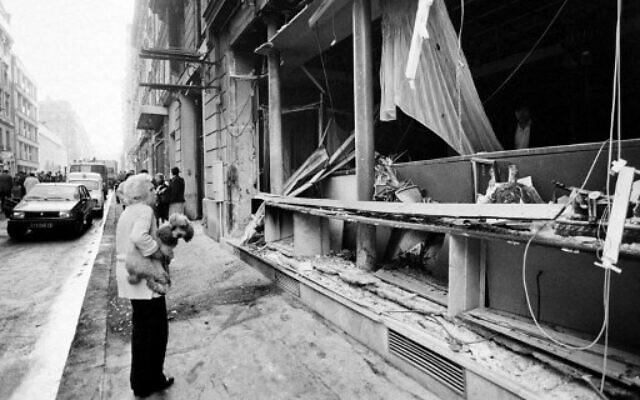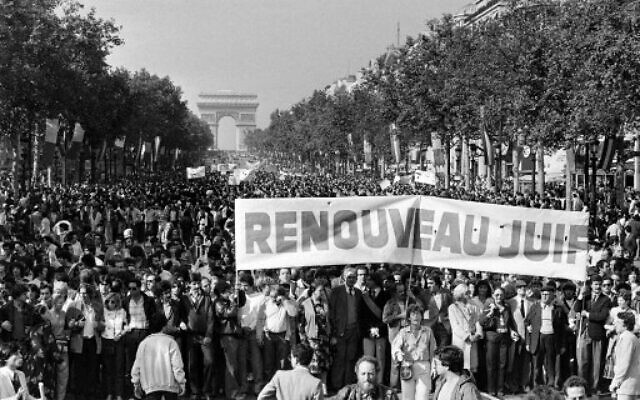PARIS, France (JTA) — The courtroom was crowded but the defendant’s seat was empty Monday as a landmark trial in French Jewish history got underway, nearly 43 years after the synagogue bombing that Hassan Diab is accused of orchestrating.
An arrest warrant over the 1980 bombing that killed four people and injured 46 was first issued in 2008 for Diab, a Lebanese academic living in Canada. Both prosecutors and French Jews who are hoping for a sense of resolution after decades of trauma.
“Hassan Diab’s decision not to appear in your court is a major affront to your jurisdiction,” the Attorney General said during the first day of the trial, during a discussion on whether an arrest warrant should be issued. a move that would require a trial. to be dismissed
“What human being wouldn’t make the same decision?” Diab’s attorney, William Bourdon, responded regarding his client’s choice not to travel to France for the trial. “This decision is humanly respectable. It is not a sign of cowardice in any way.”
The Reform Synagogue that was bombed on Rue Copernicus is located in the center of an affluent residential area in the 16th arrondissement of Paris. Today no visitor would be able to tell that the ceiling was once shattered into millions of tiny pieces, that the floor was covered in blood. If not for the memorial plaque at the entrance, nothing would indicate that the synagogue was once the scene of a deadly terrorist attack.
Yet the trial has been fraught with fear and anxiety since what is now known as the Rue Copernicus bombing on October 3, 1980, considered the first deadly antisemitic attack in France since the Holocaust. Since then, a string of anti-Semitic attacks on sectarian targets and individuals has left many French Jews feeling apprehensive about both their personal vulnerability and the state’s commitment to their protection.

French lawyer David Perre (L), of the French Association of Victims of Terrorism (AFVT), Corinne Adler, a victim who was 13 at the time, and French lawyer Antoine Casabolo Ferro of the French Association of Victims of Terrorism (AFVT) attend . The start of the trial in absentia of Hassan Diab, accused of the 1980 bombing of the Copernicus Street Synagogue, at the Palais de Justice courthouse in Paris on April 3, 2023. (Bertrand Guay / AFP)
But while the prosecution of some potentially anti-Semitic attacks has not always satisfied French Jews, the long process of bringing Diab to trial has suggested great diligence on the part of many involved.
The synagogue’s attorney and one of the victims, Bernard Kahane, now in his 80s, promised he would see the case through to the end.
“Whatever the outcome, this has been going on for a very long time,” he said in an interview to the Jewish Telegraphic Agency, adding with a joke, “Everyone is surprised that I am still here to represent my clients.” “

This file photo taken on May 24, 2016 shows Hassan Diab, who was arrested in November 2008 for his alleged role in the 1980 Paris synagogue bombing, as he arrives at a Paris courthouse. (AFP/Bertrand Guay)
Kahane represents Monique Barbe, who lost her husband in the bombing when she was 37. Now nearly 80 and living in the south of France, Barbe will not appear at the trial.
“I don’t have the strength. But I can’t wait for this to be over.”
That Friday evening about 300 worshipers were attending a Shabbat service and celebrating a five-time mitzvah when a bomb exploded just outside the synagogue at 6:35 p.m. The door flew off, the glass ceiling fell on the worshippers; Wooden benches were introduced throughout the room.

File: A pedestrian looks at the damage after the bombing of the synagogue rue Copernicus in Paris, October 4, 1980. (JEAN-CLAUDE DELMAS/AFP)
The scene outside the synagogue was even more gruesome. In his book about the case, French journalist Jean Chichizzola describes “cars thrown across the street like children’s toys,” “licking the upper floors of adjacent buildings” and “blown out street-side shop windows”. Did.
Four bodies were lying in an area resembling a war zone. Israeli TV journalist Aliza Shagir, 44, was caught in the explosion as she was passing by. Philippe Boisseau, 22, who was riding his motorcycle, also died on the spot. Driver Jean-Michel Barbe was found dead in his car, parked just outside the synagogue, where he was waiting for customers arriving at the service. Nearby, a hotel employee named Hilario Lopes-Fernandez was seriously injured and died two days later.
Investigators quickly established that the bomb had been placed in the saddlebag of a Suzuki motorcycle parked in front of the synagogue. This meant that the worshipers left the building, which would undoubtedly have killed many more people. But the ceremony started a few minutes late.
At first, a man close to a neo-Nazi group claimed responsibility for the attack, misleading investigators for months before confessing that he had nothing to do with it. The attack was eventually attributed to the Popular Front for the Liberation of Palestine-Special Operations, an extremist group in the Middle East, and investigators alleged that Diab had planted the bomb. After an arrest warrant was issued in 2008, he was extradited from Canada in 2014, charged in Paris and jailed.
But in a surprise to many, Diab’s case was dismissed in 2018, allowing him to return to Canada as a free man. Prosecutors appealed, leading to another surprising turn of events in 2021, as the court upheld the earlier ruling, directing Diab to stand trial.
Historian Mark Nobel told JTA, “It is a deep wound for the Jewish community and here in France people remember this terrible attack.” “Let’s not forget how shocked and hurt we all were at the time.”
Indeed, the outrage was intense in the immediate aftermath of the bombing. France’s leading trade unions called for a nationwide strike as a sign of solidarity with Jews, while government ministers promised a quick response and police officers were deployed to other Jewish sites. Meanwhile, Jews marched in the streets, some vowing to take security into their own hands, in a demonstration that foreshadowed longer tensions within French Jewry.

FILE: Demonstrators walk down the Champs Elysees protesting the bombing at the synagogue rue Copernicus in Paris, which killed four people and injured 30 others, October 4, 1980. (JEAN-CLAUDE DELMAS/AFP)
Four decades later, Monique Barbe reflects on the tragedy that changed her life forever.
“It has ruined my life. I panicked for a very long time,” she said. “Imagine, I had to go to identify my husband’s body. At the police station, they gave me his half-burnt identity card and his damaged Gave back the wedding ring, that was all I had left.
But she questioned how much the bombardment and lawsuit should register for those whose connections are more distant than that.
“I do believe it’s a necessary test, but except for people who have lost loved ones, I don’t see why anyone would even think about it today, it’s been so long,” Barbe said. “Plus there have been a lot of terrorist attacks since then.”
Jean-François Benchel, president of the Copernican synagogue, thinks the test is actually very important even for people who weren’t born at the time of the attack.
“It is engraved in the history of our community,” he said in an interview. “It is difficult for us to understand why Hasan Diab chose not to appear in the trial but nothing is over yet. I want to believe that justice will be served.
Benshall said the most lasting effect of the attack may not be in the trial, but in the heavily guarded infrastructure that is now familiar to anyone involved with French Jewish institutions.
“Sadly, Synagogues in France (and many other places) are all under security, even though it is completely counterproductive to have security measures at a place of worship where you would normally aspire to peace,” he said. . “It shows that something is not right with the world.”